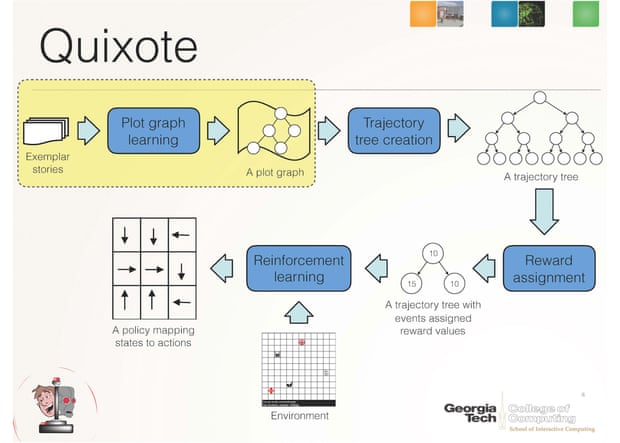In this article written by Alison Flood posted on The Guardian website, She addresses a new strategy in order to teach Robots to learn human values. And what is the new method attempting to teach human values to AI? Storybooks. We all remember classic stories from growing up, teaching patience and respect for others. Well now Mark Riedl and Brent Harrison, from the School of Interactive Computing at Georgia Institute of Technology have created a system that acts as a prototype that is able to learn human values and social conventions from those childhood stories. They call this system Quixote. Quixote is able to run simulations virtually and gets rewarded after doing the correct actions similar to the story (see chart below).
I believe this is a very interesting way to attempt to solve some of the issues and concerns that face AI. However, I began to wonder if this may also be dangerous depending on the type of story fed to the robot. I am sure as AI continues to advance, we shall see an increase in the human values encoded into robots and artificial intelligence.

It's a very interesting concept. However, it could be used to teach robots traits other than human kindness and proper emotional reactions. Storybooks tend to be idealistic in terms of what happens, and stories in general tend to err on the side of the extreme (for example, what if Quixote analyzed Game of Thrones into a robot's memory). What might be a next step would be the ability for Quixote to decode human speech into text and analyze that, just as if it was a storybook.
ReplyDeleteP.S. Did students at Georgia Tech create this? I wonder how long it took to make!
It's a very interesting concept. However, it could be used to teach robots traits other than human kindness and proper emotional reactions. Storybooks tend to be idealistic in terms of what happens, and stories in general tend to err on the side of the extreme (for example, what if Quixote analyzed Game of Thrones into a robot's memory). What might be a next step would be the ability for Quixote to decode human speech into text and analyze that, just as if it was a storybook.
ReplyDeleteP.S. Did students at Georgia Tech create this? I wonder how long it took to make!
I think that this would be very interesting, in my short story I had my robot learning from a child maybe I should have had the child read the robot a story.
ReplyDelete